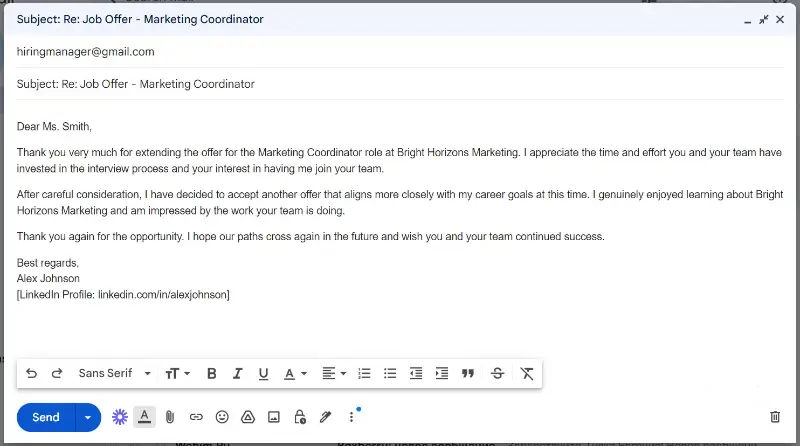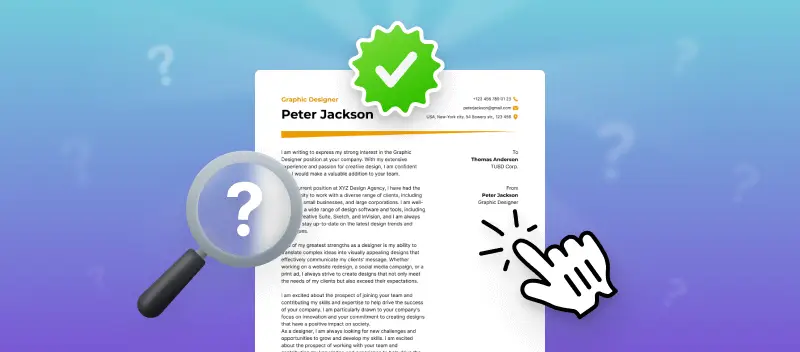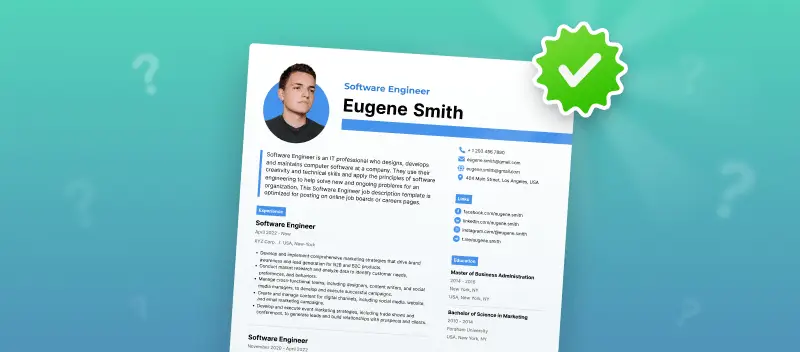Providing a list of references on a resume is an essential part of a successful job search. This list of contacts gives potential employers a way to get in touch with someone who knows you personally.
A reference is a person who can provide information about your qualifications, skills, work experience, and character to a potential employer.
This article will provide an overview of:
- What resume references are?
- How to list references on a resume?
- Resume examples with the recommender's information.
You will also find helpful advice on how to decide who to ask to be your academic or professional references. Moreover, we will explain some common mistakes to avoid when listing references on your resume.
By having a clear understanding of what to include in this resume section, you can increase your chances of impressing potential employers and getting hired for the job you want.
Why do I need references?
"Networking is not about just connecting people. It’s about connecting people with people, people with ideas, and people with opportunities."
Having references on the resume can help you strengthen your application. These serve as endorsements or testimonials of your abilities and suitability for a job.
The people you choose to include offer potential employers the possibility to verify the information on your resume and get insight into your abilities and characteristics through their eyes.
Also, hiring managers will see that you have committed to asking others to support your job search.
Professional references demonstrate that you are a trustworthy person who has been successful in the past. They attest to your positive work history. This can help hiring managers make a more informed decision as to whether or not they should offer you the job.
When do you need to provide references?
Around 87% of employers say that they check the provided references during the hiring process. (SHRM)
Including the names and phones of recommenders on your paper is not always necessary. Generally, you may need to enter resume references when applying through a company's website. It is also appropriate to supply contact details as a separate document/email if the employer requests them in the job listing.
However, you may choose to include references in your resume to express that there are reliable people eager to support your application. This can be especially helpful if they are well-known in your industry or directly connected to the company.
How many references should you have on a resume?
The number of recommenders depends on the job and the company you are applying to. Some employers may ask for three, while others may prefer just one. In general, having two or three professional references is ideal.
IMPORTANT:
Make sure you obtain consent before citing anyone as your recommender.
How to list references on a resume?
A well-formatted references section will give potential employers a better insight into your professional character, and show your openness and ability to make connections.
The following suggestions for how to put references on the resume:
- Include the reference's name, title, organization, phone number and/or email address, and relationship to you.
- Use consistent formatting throughout the section. For example, if you bold one name, bold them all.
- Make sure each reference is on a separate line to keep your document neat and organized.
- Keep the list of references for a job short - typically no more than two to three references.
- Include the words "Other references are accessible upon inquiry" at the end of the section. This indicates that you have more references available if needed.
- Always ask permission before placing someone as a reference to verify they are willing and prepared to speak on your behalf.
Tips on how to write references on a resume
1. Select Carefully
Choose your references carefully, focusing on professional contacts who can effectively validate your qualifications, skills, and expertise relevant to the job you're applying for.
Prioritize references with whom you've had a working relationship for at least a year. This helps ensure they can provide a comprehensive assessment of your abilities.
2. Avoid Personal References
Maintain the integrity of your reference list by refraining from listing family members and close friends as professional references.
If you lack professional references, consider including contacts of professors or teachers from your college or university.
3. Limit Quantity
Strive for a balance by including a reasonable number of references, typically no more than five, to provide a well-rounded view of your capabilities without overwhelming the employer.
Keep the reference section concise and to the point, providing only essential information about each reference.
4. Format Consistently
Enhance your resume by organizing the reference section in a manner similar to the rest of your document, ensuring clarity and professionalism.
5. Obtain Permission
Before finalizing your reference list, ensure you have explicit consent from each individual to include them as references on your resume. Make sure they have time to vouch for you when needed.
It's crucial that your recommenders understand the potential for contact from prospective employers and are prepared to provide a positive evaluation.
6. Prepare Your References
Before listing people's names on your resume, inform your recommenders about the job you're applying for, so they can tailor their responses accordingly if contacted.
Provide your references with a copy of your resume and any relevant job descriptions to help them prepare.
7. Follow Up
After sending in your resume or meeting with a potential employer for an interview, contact your references to let them know when they may be contacted.
Keep your references updated on your job search progress and inform them when you've secured a position. After you get the job, thank all your supporters.
Sample reference list in a resume
Here is an example of what a reference page for a resume may look like:
John Doe - Former Manager | Best Buy
Minneapolis, MN
(555) 555-1234
john.doe@best-buy.comJane Smith - Former Academic Adviser
Associate Professor of Mathematics | Columbia University
116th and Broadway, New York, NY 10027
(666) 666-2345
jane.smith@columbia.eduBeth Brown - Former Volunteer Coordinator from 2019 to 2023
Pitt County Animal Shelter | Greenville, NC
(777) 777-3456
beth.brown@pitt-ash.com
Resume with references examples
Resume references templates
Professional reference template 1:
- [Name of the recommender], title (job position)
- Place of work, address
- Phone number and/or email
Professional reference template 2:
- [Name of the recommender], contact info
- Relationship to you and the years known
- Title, place of work
Create your professional Resume in 10 minutes for FREE
Build My Resume
What are the types of references on a resume?
Well-chosen recommenders may help strengthen your application. You want to choose someone who knows you well and can speak positively about you. One way to find references is to think of people who have supervised or worked with you in the past.
There are four common reference types. See the table below.
| Type of reference | Description | Example |
|---|---|---|
| Professional References | Professional references can elaborate on your performance and have witnessed how you behave in the work environment, complete tasks, collaborate, and communicate with others. | Former supervisor or manager; colleague or coworker; client or customer; business partner or collaborator |
| Educational References | Educational references are individuals who have seen you in the academic environment. Listing educational references is beneficial for those commencing their careers or transitioning from one field to another. | Professor or academic advisor; school counselor; research mentor; thesis or project coordinator |
| Character References | Character references are people who can affirm your honesty, trustworthiness, and other ethical qualities. | Community leader; volunteer coordinator; religious mentor; coach |
| Personal References | Personal references have had a long acquaintance with you and can attest to your character and abilities. Be careful and do not overuse this type of reference as getting too personal in the professional setting may be a disadvantage. | Mentor or advisor from a personal development program |
21% of Americans have admitted that they have included fake references in their resumes. 29% of employers report discovering this deception. (Zippia)
When selecting which references to list on your resume, it is important to pick individuals who are well-acquainted with you. Ensure that they can confirm your capabilities and accomplishments.
How different people can serve as your references for a job:
- Managers. Former or current supervisors are excellent references because they can vouch for your work ethic, performance, and success in a professional setting. Your previous employer is an ideal reference as they can speak to your job performance and skills.
- Colleagues. If you had great working relationships with your teammates, they could shed light on how you handle yourself in the workplace. A former colleague can provide insight into how you work in a team, as well as your ability to collaborate with others.
- Professors. Your professor can be a good reference to attest to your academic achievements and knowledge. If you are applying for a job related to something you studied, teachers can provide details about your knowledge and abilities in the subject matter.
- Clients. If you have had positive experiences with customers, they could make a good reference. They can affirm how you handled customer relations and responded to issues and requests.
- Community Leaders. Project coordinator of a local charity may supply information about your volunteer work or leadership abilities. If you have been a volunteer, the head of that organization or one of their advisers may be a good source of information on your time management, communication skills, and dedication to the cause.
- Coaches. If you play sports, your coach can be one of your references. They can attest to certain qualities that are valuable for a job.
- Mentors. If you have a person who advises you, they can also be on the list of your references on the resume. A mentor who has seen you grow professionally and helped you build new skills is an important reference for a potential employer.
- Supervisors. If you’ve completed an internship, your direct supervisor can speak to your adaptability and potential.
No matter which type of reference you choose they must be able to validate your skills and qualifications. Ensure that you supply them with all the necessary information before submitting your resume so that they can accurately represent you as an applicant.
Who not to include as references?
It is critical to select references carefully before putting them on your resume. While references may help land a job, there are some people you should avoid including.
Avoid listing contacts of:
- Your former boss or supervisor is usually the best reference. However, if you had a negative experience with them or don't trust their opinion of you, it is best to leave them off your list.
- Friends and family members are also not good choices for reference. They may be able to speak highly of you, but they do not have an objective view of your professional skills and abilities.
- Anyone who cannot speak to your work performance or skills. This includes classmates, neighbors, and acquaintances who don't know anything about your professional abilities.
- If you worked for a company that has gone out of business or does not exist anymore, it is not a good idea to include someone from that job as a reference. The lack of contact information may be off-putting to potential employers.
It is always better to err on the side of caution when selecting references for your resume.
How to ask someone to be your reference?
The research shows that about 20% of the time, the candidate is rejected after the hiring manager talks to the provided references. (LeaderStat)
As you compile your list of references, consider how comfortable you are asking each person to provide you with a recommendation. In general, if you are citing an individual to attest to your working or academic qualities, that means that the two of you know each other pretty well.
Follow these helpful suggestions:
- Consider who to ask. Opt for those who are acquainted with your talents and can extol them.
- Explain why you are asking. Make sure the person understands why you need their help. Let them know specifically how their endorsement could benefit you in your job search.
- Ask directly. Be direct and professional when making the request in person or via email or phone. Briefly explain the position you are applying for and why you think they would make a great reference.
- Offer to provide information. Give them an up-to-date copy of your resume, relevant job listings, and any other materials that might help them when contacted by the hiring manager.
- Follow up gracefully. Don't pressure your references if they don't respond right away. They may be busy, or simply need time to evaluate their availability to commit to being a recommender for you.
- Show appreciation. Thank your references for their help and keep them updated on the latest updates of your job hunt. Send them a thank-you card or small gift after you land the job!
Example of an email asking for a reference
Subject: Request for a Reference
Dear Dr. Thompson,
I hope you are doing well. I am reaching out to ask if you would be willing to serve as a reference for me as I apply for a position as a Marketing Associate with Willow & Co.
Working with you during my internship gave me valuable experience in marketing strategy. I believe your perspective would be especially helpful in highlighting my dedication. I am eager to bring these strengths to my next role, and I think your recommendation would make a significant impact on my application.
If you’re comfortable providing a reference, I’d be more than happy to send any information that might be helpful. Thank you very much for considering my request—I greatly appreciate your time and support.
Warm regards,
Emily Harper
emily.harper@email.com
(555) 789-4561
Having good references is a vital part of the job search process and can help you surpass other candidates.
Before sharing someone's contact details, be sure to inquire if it is okay to cite them as your recommender before including them on your resume. You want to confirm they are aware of your application and available if an employer contacts them for a reference check.
Follow up with your references
Once you have narrowed down your list of references and asked for their permission to be included, keep the recommender updated as the application process goes on. Provide the information of the employer so the person knows who is supposed to call or email them.
If you receive a rejection before the reference check, let your recommenders know that they should no longer expect this company to contact them.
Also, if you do get invited to an interview or later land the job, tell them. They will be happy to hear that their effort to endorse your candidacy paid off. Remember to thank your references regardless of the outcome.
FAQ
- Should I include professional references from all my previous jobs?
- It's generally best to include references from your most recent and relevant positions. If you have a long work history, you don't need to include references from every job.
- Should I add references on the resume from my current employer?
- Exercise caution when listing references from your current employer, especially if you haven't informed them that you're seeking other employment opportunities. You may prefer to use references from previous positions.
- What if I don't have many professional references?
- If you're lacking professional references, consider including references from volunteer work, internships, or academic projects. You can also ask mentors or individuals from professional organizations you're involved in.
- Is it okay to include references from social media connections?
- It's possible to ask social media connections to be your recommender. However, it's generally preferable to choose individuals who have a more direct and substantial professional relationship with you.
- Should I provide different references on my resume for different types of jobs?
- Yes, if possible, try to tailor your list of references to align with the requirements and preferences of each job you're applying for. Choose references who can speak to the skills and qualities most relevant to the position.
- Do employers always contact references?
- Not necessarily. Some employers may request references but never actually contact them. However, it's important to provide accurate and reliable references in case they are contacted.
- What if I can't provide references due to confidentiality agreements or other reasons?
- If you're unable to provide references for certain positions, you can explain the situation to the employer and offer alternative solutions. For example, provide references from other sources or offer additional documentation.
- How long should I keep my list of references updated?
- It's a good idea to regularly update your list of references. Especially if your relationships with certain individuals change or if you acquire new references through additional work experiences or networking opportunities.
- Can I use the same references for multiple job applications?
- Yes, you can use the same references for different applications. However, make sure to inform your references each time you provide their information to a potential employer. Also, consider updating your references if necessary to better match the requirements of each job.
Conclusion
Resume references are an important aspect of job applications. Potential employers contact them for a better understanding of the applicant. An efficient method of acquiring references is to ask individuals who can verify your skills, character, and accomplishments.
It is important to select reliable people who can vouch for your abilities and work ethic. Their contribution may be the deciding factor whether you get a job offer or not.





